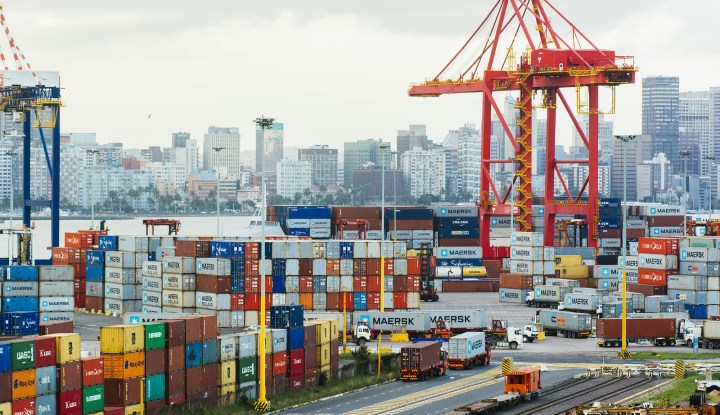MARINE PROTECTION SUMMIT
Shipping industry not letting just transition sail by, though ambition seems stalled

South Africa has been fence-sitting when it comes to pushing decarbonisation ambition at the MEPC 79, due to what seem to be concerns about the cost of a just and equitable transition in the shipping industry.
A just transition has been at the forefront of climate action and it seems no sector is being left behind in the conversation, with the shipping industry starting to raise ambition on the topic at the ongoing global shipping industry talks. South Africa, however, has been on the sidelines of pushing ambition.
The global gathering, the Marine Environment Protection Committee 79 (MEPC 79), hosted by the United Nations’ International Maritime Organisation (IMO), has seen climate-vulnerable and ambitious countries push the committee to adopt a zero-emissions-by-2050 position, a shift from the current target of halving emissions by 2050.
South Africa has been fence-sitting when it comes to pushing decarbonisation ambition at the MEPC 79, due to what seem to be concerns about the cost associated with a just and equitable transition in the shipping industry. The country said it supports decarbonisation but without being specific about measures that need to be taken.
According to MEPC 79 discussions, a move to lowering emissions for the industry includes moving from the tar-like, low-grade residual fuel to greener alternatives, placing a levy on carbon emissions from ships, the energy efficiency of ships, to peak emissions before they decline; all efforts to reduce carbon emissions in line with the Paris Agreement global average temperature goal limit of 1.5°C.
Alternative fuels
About 90% of the world’s cargo is transported by ships, which means the shipping industry is responsible for nearly 3% of global greenhouse gas emissions, making it the seventh-biggest polluter in the world.
With the increase of globalisation and demand for more goods, and a devastating climate crisis, fuel alternatives need to be explored. Options on the table include green ammonia (considered highly potent but emits zero carbon) and biomethanol, though the jury is still out on which to pursue or how the industry would go about it.
Green corridors and South Africa’s concerns
As the industry considers its decarbonising options, it has looked at the development of green shipping corridors: zero-emission fuel stops along maritime trade routes between two or more ports to help accelerate green fuels in the industry.
On the plenary floor, South Africa raised its hand, saying that while it was committed to supporting decarbonising the shipping industry, the country was concerned about its coal-reliant grid, and how greener fuel would be dispensed in light of such a challenge.
Read in Daily Maverick: “Pacific Islands’ proposed carbon levy on shipping could be a lifeline for developing countries”
The MEPC has yet to discuss, or even table, funding options for developing countries to start working to help the shipping industry to decarbonise.
A study by the P4G Getting to Zero Coalition, “Shipping’s Energy Transition: Strategic Opportunities in South Africa”, found that the country has great potential to benefit from decarbonising international shipping, because it has strong maritime connections and large renewable potential that could spur industry growth and a just transition, especially given its geographical setting as a gateway between the Atlantic and Indian oceans.
It states, however, that for the country to bring forth this transition and actualise its potential, it would have to define national objections and support global policies on decarbonisation – a move about which South Africa seems to be sitting on the fence.
Dr Alison Shaw, a research associate at the UCL Energy Institute, said in a briefing that for the most-climate-vulnerable developing countries, such as small island nations, raising policy ambition in line with limiting warming to 1.5°C, or less, is a matter of survival. But it also represents an opportunity to be part of developing a multilateral solution in which shipping transitions towards a more sustainable future.
A just transition
At the centre of a just transition are the seafarers – the daily problem solvers of the sea. To pull off the transition, workers would need to be reskilled, and this is a key bottleneck, said the International Transport Workers’ Federation (ITF) in a presentation at the MEPC.
With the possible introduction of a new fuel such as ammonia – which is considered highly dangerous – workers would need to be skilled in fuel-handling and safety measures. With less than 2% of seafarers being women, the industry would also need to diversify its workforce; the lack of diversity is highly reflected at the MEPC, attended mainly by white older men from developed countries and very little representation from developing countries.
Read in Daily Maverick: “The lowdown on the 79th Marine Environment Protection Committee and why you should care”
MEPC 79 comes to a close on Friday, and many ambitious states and organisations hope to see action that will shift the needle in the shipping industry’s climate action goals. As for South Africa, its unclear ambition leaves it on the fence regarding an opportunity to not only decarbonise shipping, but also further develop its own alternative fuel infrastructure.
Said Shaw of the country’s decarbonisation: “The development of a basket of measures to drive shipping’s decarbonisation is ongoing. Many countries have questions that will only be answered as the collective of member states work together to develop policy, but what we can see is growing recognition of the opportunities and new markets that shipping’s transition can bring. For South Africa, these may be significant and underline the need for the country to engage in creating a high-ambition strategy which unlocks these opportunities.” DM/OBP



















 Become an Insider
Become an Insider
Comments - Please login in order to comment.